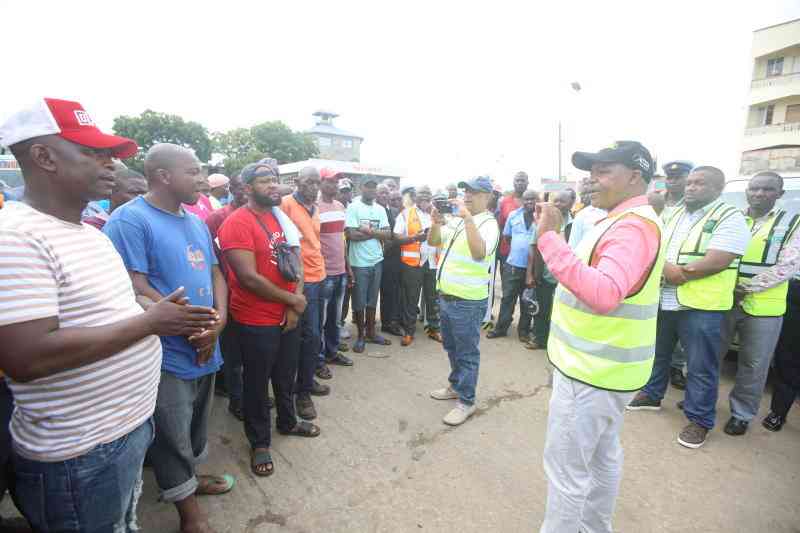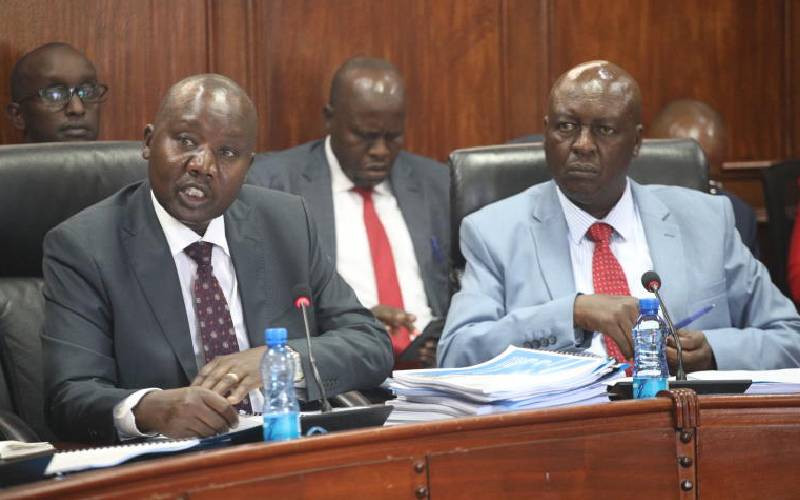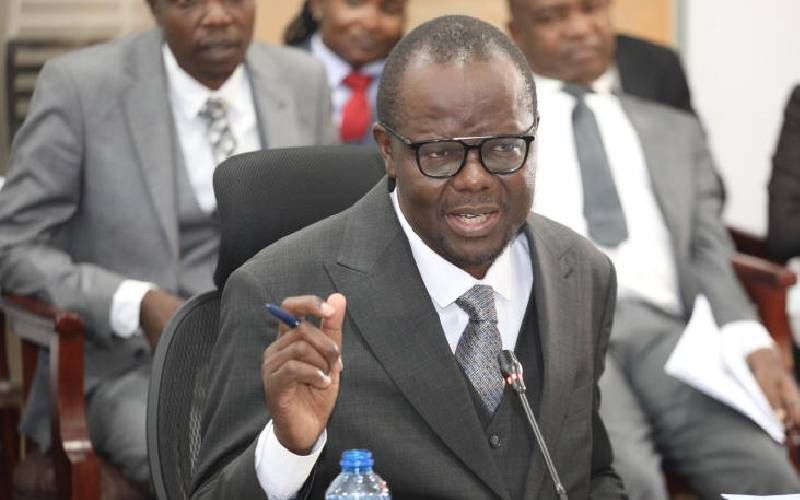
In a remote corner of Uyombo sub-location, in Kilifi North Constituency, lies Uyombo village, a quiet place where the rhythms of life have long remained undisturbed.
However, this village, with its sun-kissed beaches and sprawling landscapes, now finds itself at the centre of a heated debate that has gripped the nation’s attention. A proposed nuclear power plant could soon transform this tranquil area.
Kilifi County, famed for its pristine white sandy beaches, has long been a jewel in Kenya’s tourism crown. Its coastal resorts, hotels, and beach bars are popular with local and international tourists. Visitors come to bask in the sun, to sail on turquoise waters, snorkel amidst vibrant coral reefs, or simply enjoy the rich biodiversity of the surrounding mangrove forests.
For decades, fishing communities have thrived along these shores, providing fresh seafood for the region’s restaurants. This idyllic setting, however, is now threatened by a power plant proposal that could change the landscape forever.
The government, through the Nuclear Power and Energy Agency (NuPEA), plans to construct a Sh500 billion nuclear power plant aimed at generating 1,000 megawatts of electricity to support Kenya’s growing energy needs.
Scheduled to begin in 2027, with the plant expected to be operational by 2034, this ambitious project is part of Kenya’s broader strategy to diversify its energy sources. The country has already made significant strides in renewable energy, with 86 per cent of its installed capacity of 3,000 megawatts coming from geothermal, wind, and solar power. The addition of nuclear energy to this mix is seen as a critical step in ensuring Kenya’s energy security and reducing its dependence on fossil fuels.
Fears, opposition grows
- Nurses save lives of pregnant women as doctors strike bites
- 17 cases of diarrhoea reported in Kilifi IDP camp
- Alarm over rising mother-to-child HIV transmission in Kilifi
Keep Reading
The proposal, however, has not been embraced by all. In fact, it has sparked intense opposition, particularly from the local community, environmentalists, and rights groups. In a modest building by Mida Creek, a swampy, biologically rich area known for its mangrove forests and as a sanctuary for birdlife, local residents and concerned groups meet regularly to voice their concerns. These concerns revolve around the potential dangers of nuclear accidents, radiation leaks, and the broader environmental and social impacts of the proposed plant.
James Kea, a resident, expressed his fears. “Following a nuclear explosion, radioactive particles mix with dust in the air and spread into the atmosphere. In unfavourable weather, this radioactive dust sweeps up into the clouds and rain, travelling far beyond the test site,” he warned. For many, the spectre of accidents and radiation contamination is too great a risk to bear.
Environmentalists add to the growing chorus of concern. Studies, they say, have shown that children living near nuclear power plants are more likely to develop conditions like leukemia, and the incidence of cancer rises due to radioactive emissions. Such risks, they argue, cannot be ignored in a country where environmental awareness and legal protections are still evolving.
Legal battle: A community in crisis
As the opposition continues to grow, residents have turned to the courts. In July 2023, lawyers Collins Sang and Cecilia Ndeti filed a lawsuit on behalf of Kilifi residents in the environment court.
The lawsuit, which seeks to halt the construction of the nuclear power plant, argues that the process has been rushed and is “illegal.” The petitioners say public participation meetings were “clandestine” and that NuPEA should not proceed with any plans to fix the site for the plant until adequate safeguards and laws are in place. They have called for a more transparent process and for the involvement of the public at every stage.
NuPEA, however, insists that construction will not begin for years. In response to the lawsuit, they have emphasised that laws are still under discussion and that the public participation process is ongoing. As of now, hearings are continuing, and a decision has yet to be reached.
In November, Kilifi residents took their concerns to the national stage, filing a petition with Parliament calling for a full inquiry into the project. The petition, sponsored by the Centre for Justice Governance and Environmental Action (CJGEA), highlights the lack of information available to the public about the proposed plant and the criteria used to select the site.
The petition raises concerns over the risks to health, the environment and tourism in the event of a nuclear spill, saying the country was undertaking a “high-risk venture” without proper legal and disaster response measures in place. The petition also flagged concerns over security and the handling of radioactive waste in a nation prone to floods and drought. The Senate suspended the inquiry until the lawsuit was heard.
Fishing communities at risk
One of the most significant concerns raised by the community is the potential threat the nuclear plant poses to aquatic life. Fishing is not just an occupation for many villagers; it is their way of life.
The coral reefs in the Watamu Marine National Reserve, which is a protected area, have shown significant recovery over the last decade. However, local fishermen fear that the thermal pollution from the nuclear plant’s cooling system—designed to suck large amounts of water from the ocean and return it at higher temperatures—could undo years of progress, potentially killing fish and micro-organisms like plankton that are essential to the marine food chain.
In the Mida area and the expansive Arabuko-Sokoke Forest, some villagers depend on tourism, and fishing, and others on beekeeping groups and butterfly farming. The forest is a Unesco biosphere reserve.
Timothy Nyawa, a fisherman at Uyombo Beach, expressed his anxiety over the potential damage. “I have been fishing for 20 years, and I survive by fishing. If they build the nuclear plant here, the breeding sites for fish will be destroyed, and there will be no fish left to catch,” he lamented.
The threat is not limited to the fishing community. Property owners and real estate agents also fear that the presence of a nuclear plant will dampen the appeal of the area as a tourist destination. Many believe that tourism, which has been a significant driver of the local economy, will suffer. The possibility of a drop in property values due to the perceived risks associated with the nuclear plant is causing anxiety.
A divided community
Despite the vocal opposition, there are those in the community who are open to the idea, provided their concerns about health and the environment are addressed. Some villagers have expressed a willingness to support the project, but they insist on more information and a clearer understanding of the potential benefits and risks. They urge NuPEA to engage directly with them, educating them about the pros and cons of the proposed plant.
Many villagers, particularly those with limited education and access to information, rely heavily on political leaders for guidance. Some have been told that the project poses an existential threat to the fishing industry and the environment. This information, however, has not been substantiated by concrete evidence, and much of it is based on rumour and fear rather than fact.
Faki Ahmed Shariff, a fish vendor in Bandarini, pointed out the lack of awareness among residents. “Most people do not understand what the nuclear power plant is or how it will affect us. Some of the men here even believe that the plant will affect their manhood or fertility,” he said.
Women, too, have expressed concerns that the plant could lead to miscarriages, premature births, or babies born with deformities.
‘’They should have educated us before making any plans because a majority of us do not have any information about the dangers and the positive side of the plant,” said Shariff.
Despite protests from residents and certain leaders against the proposed plant, Shariff emphasized that their objections stem from a lack of understanding regarding its benefits.
He asserted that only a limited number of villagers have had the opportunity to engage with NuPEA and the project’s proponents in Kilifi Town.
“The community is hungry for credible information. We will decide based on the information we have received,” he said.
NuPEA Chief Executive Justus Wabuyabo agreed that hostility towards the project was fueled by misinformation and myths but said the agency was experiencing budget constraints to visit all affected villages.
“We will do public participation based on what the law demands and what the people will expect. We have heard the communities’ concerns but due to budget constraints we cannot visit all villages,” said Wabuyabo.
He said NuPEA formed a 13-member committee comprising selected members from the villages and its officers to sensitize the communities about the project.
Open to proposals
“We are open to proposals from the locals and the committee. We stopped erecting the mast after a misunderstanding arose to engage the community. We will move with them every step of the way,” he said.
The construction, originally planned to start earlier this year, has been postponed to an unspecified date. In an interview, NUPEA said construction would not begin as laws were under discussion, and public participation was being carried out.
WePlanet Africa, a grassroots movement dedicated to tackling climate change and biodiversity loss, said there was a need to debunk disinformation and myths about the nuclear power plant.
“We support the development of nuclear energy as a clean and reliable source of power, however, we are deeply concerned about the reported tensions between the government and the community in Kilifi regarding the proposed plant. A collaborative dialogue is essential to address any concerns and ensure the project’s success,” said Patricia Nanteza, Africa Regional Coordinator WePlanet Africa.
She said that if the local community opposes the project, their wishes must be respected rather than imposed from above.
“It is the right of people to determine for themselves what is best for their local communities. When we visited the area we realized the gap and lack of credible information about the project,” she said.
Peter Gichuki of WePlanet Africa said they have started generating online materials to debunk nuclear power plant myths.
‘’There are many positive sides of hosting nuclear power plants, such as supporting the country’s economic growth and local employment. However, sometimes there are divisions within the community in terms of support and this has to be discussed. While safety reviews are crucial for the start of the plant, it is the local community that must consent to the idea,” he said.
The country has over the years stepped up efforts to actualize its nuclear energy dream and has been sending dozens of students abroad to developed economies using nuclear energy, to boost their skill sets and ensure that the country does not wholly import the labor.
Nupea published an impact assessment report last year that recommended policies be put in place to ensure environmental protections, including detailed plans for the handling of radioactive waste; measures to mitigate environmental harm, such as setting up a nuclear unit in the national environment management authority; and emergency response teams. It also proposed social and economic protections for affected communities, including clear guidelines on compensation for those who lose their livelihoods, or are displaced from their land, when the plant is set up.
 The Standard Group Plc is a multi-media organization with investments in media platforms spanning newspaper print
operations, television, radio broadcasting, digital and online services. The Standard Group is recognized as a
leading multi-media house in Kenya with a key influence in matters of national and international interest.
The Standard Group Plc is a multi-media organization with investments in media platforms spanning newspaper print
operations, television, radio broadcasting, digital and online services. The Standard Group is recognized as a
leading multi-media house in Kenya with a key influence in matters of national and international interest.











